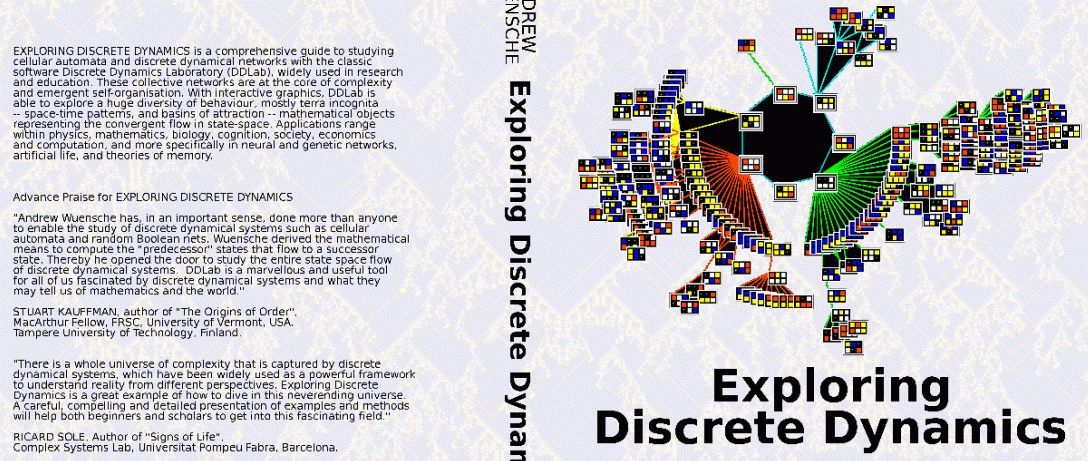

| Exploring Discrete Dynamics Reviews |
| "Exploring Discrete Dynamics" by Andrew Wuensche was published in 2011 by Luniver Press (xxxvii + 498 pages, 290 figures, 31 tables, 8×10in paperback) -- listed on most book sites: Amazon, Book Depository etc., and also fully accessible on Google Books. |

|
|
Review in
Kybernetes
Vol. 41 Iss:3/4, pp.525 - 526, by Andrew Adamatzky,
University of the West of England, Bristol, UK.
full PDF
(extract)
In the last 20 years Andrew Wuensche was meticulously perfecting his
approach to the analysis of cellular automata, and the more general
random Boolean networks, and discrete dynamical networks, enhancing
his DDLab software. The results of this work are now published in the
book Exploring Discrete Dynamics. In over half-a-thousand pages of
the book a reader will find unique and exciting ideas, tools,
approaches and implementations towards studying complex systems in a
cellular automaton framework.
(extract)
Wuensche's latest book, Exploring Discrete Dynamics,
presents a very extensive description of the current features of DDLab.
Successive chapters describe, in detail and depth, every function of this
tool, illustrated with numerous examples of his research.
Analyses concentrate mainly from four systems of increasing generality:
cellular automata (CAs), random Boolean networks (RBNs),
discrete dynamical networks (DDNs), and
random maps. Consequently, in this book we have a ramifcation that connects
and relates concepts naturally derived from these main subjects: reverse
algorithms, rule-space, state-space, basins of attraction, stability, order,
chaos, complexity, networks, emergent structures, classes, flters,
self-reproduction, reaction-diffusion, cryptography, and beyond.
I have been using DDLab now for the past several years as a tool to
assist in the analysis of Boolean network models of biological
systems, including gene regulatory networks. In an arena full of
toolboxes and small applications written haphazardly and often for
single projects or applications, DDLab is a refreshing resource to
turn to for several reasons:
(extract)
Discrete Dynamics Lab (DDLab) is a stunning piece of software for
exploring cellular automata (CA) and other discrete dynamical
networks, which are powerful tools in our quest to understand the
complexities of life, nature and the many complex systems that
intertwine our daily lives. |
Advance Praise for EXPORING DISCRETE DYNAMICS
"Andrew Wuensche has, in an important sense, done more than anyone
to enable the study of discrete dynamical systems such as cellular
automata and random Boolean nets. Wuensche derived the mathematical
means to compute the "predecessor" states that flow to a successor
state. Thereby he opened the door to study the entire state space flow
of discrete dynamical systems. DDLab is a marvellous and useful tool
for all of us fascinated by discrete dynamical systems and what they
may tell us of mathematics and the world."
STUART KAUFFMAN, author of "The Origins of Order",
MacArthur Fellow, FRSC, University of Vermont, USA.
Tampere University of Technology, Finland.
"There is a whole universe of complexity that is captured by discrete
dynamical systems, which have been widely used as a powerful framework
to understand reality from different perspectives. Exploring Discrete
Dynamics is a great example of how to dive in this neverending universe.
A careful, compelling and detailed presentation of examples and methods
will help both beginners and scholars to get into this fascinating field."
RICARD SOLE, Author of "Signs of Life",
Complex Systems Lab, Universitat Pompeu Fabra, Barcelona.
Return to the
Discrete Dynamics Lab home page.
Last modified: June 2012